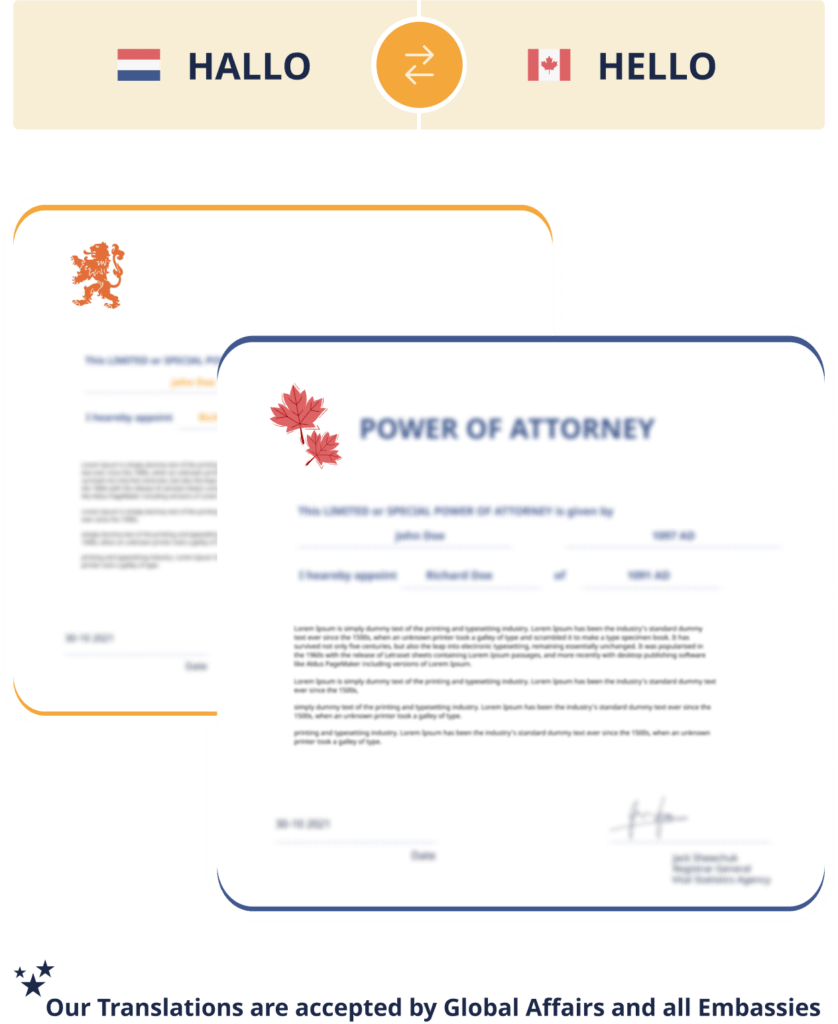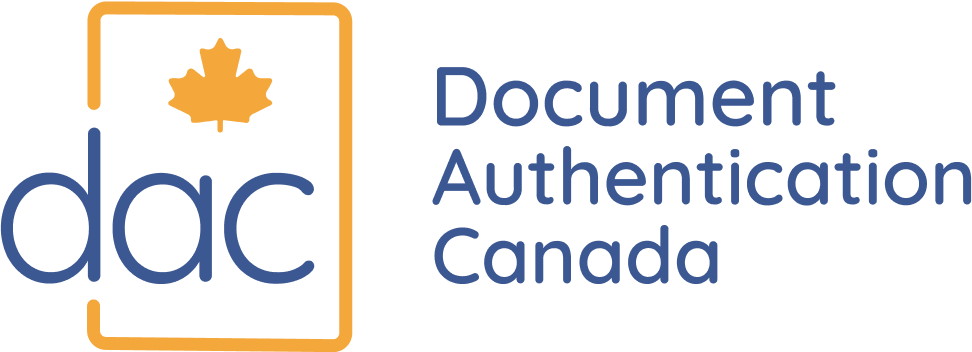Certified Translation Services in Canada
In some cases, you may need to translate your documents before Authenticating or Legalizing them. If so, we can help you obtain a certified translation.
- Accepted by Global Affairs & All Embassies
- Human powered translation into 70+ languages
- Fixed price per source word. Save money!




Free Expert Document Review

Do I Need a Certified Translation?
- Authentication: The validity of the document’s signature and stamp or seal are fully certified by Global Affairs Canada.
- Legalization: Once a document is authenticated, it’s then legalized by the embassy or consulate of the destination country, so that it can be recognized as a legal document in that country.
Not sure if your documents need to be translated by a certified translator before being authenticated or legalized? Get in touch with our expert team
So where does translation fall in the authentication process?
1
>> Translation <<
Notarization
2
AUTHENTICATION
3
LEGALIZATION
Why Document Authentication Canada?
- Our Authentication and Legalization service includes an optional ‘Certified Translation’ add-on.
- We have long-standing relationships with certified translator services for 70+ languages, ensuring your document is accurately and efficiently translated
- We can also arrange translation by the foreign embassy, consulate & mission on your behalf.
Did you know?
Price for a certified document translation starts at C$0.15 – C$0.19 per word
If you prefer finding your own certified translator, these provincial associations provide information on translators near you:

Etienne
Excellent service, great experience!
Needed to get documents legalized in Canada for the Netherlands. I had a great experience, perfect customer service, quick responses, and fair price! Overall excellent and I would highly recommend them."
Common Questions about Certified Translations
- General Information
- Requirements & Costs
1. What is certified translation?
A certified translation is a translation of a document completed by a translator who has been granted the title of “certified translator” by a provincial regulatory body. In Canada, a certified translation includes the translator’s declaration, signature, and seal. The translator accepts responsibility for the translation’s accuracy.
Document Authentication Canada offers certified translation services in Ottawa and across Canada for more than 70 languages. Get in touch with our expert team for a quote.
2. How can I find out if a certified translation is needed for authentication and legalization?
Documents that are in a language other than English or French must be accompanied by an official translation. So if your document is written in a language other than these two, or contains a mix of different languages, you will need a certified translation before your document can be authenticated by Global Affairs Canada.
When it comes to legalization, embassies and consulates have different requirements on document language. Some require a translation when the document is not in the country’s official language, while others only require a translation for specific documents or none at all.
If you’re not sure if your document needs to be translated, get in touch with our team for expert advice. We provide certified translator services to prepare your document for use in Canada and abroad.
3. What type of documents do you translate?
If you’re looking for a birth certificate translation, a marriage certificate translation, or a certified translation of a diploma to continue your studies, for employment, or immigration/emigration purposes, we can provide you with an accredited translation service for all.
We have Canada certified translators available for:
- Birth, marriage, divorce and death certificates
- Change of name
- Education documents, including Primary Secondary Diploma/Report Card, Teacher Certificate, University or College Degree/Transcript
- Criminal record checks / police clearance and fingerprint certificates
- Affidavit
- Notarized powers of attorney
- Corporate documents, such as Incorporation and Regulatory Affairs Documents
- Export Documents, including Certificate of Origin
- Apostille translations for documents originating abroad, and which are intended for use in other countries (Please note that not all states recognize apostilles, Canada is one example)
- All kinds of documents originating in a foreign country
- Documents were drawn up in Canada, but in a foreign language
- And many more!
Fill out our quick web form and we’ll help you determine if your document can be translated.
4. What languages do you translate?
Document Authentication Canada provides certified document translations from and into English and French for 70+ languages, including Arabic certified translations and Russian certified translations, as well as translations to and from:
- Chinese
- Czech
- Dutch
- German
- Greek
- Hindi
- Italian
- Korean
- Portuguese
- Punjabi
- Spanish
- Telugu
- Turkish
- Ukrainian
- Urdu
- & many more!
Get in touch with our expert team through this web form to find out if we can translate your document!
5. What's the difference between a certified and notarized translation?
A certified translation is a document translated by a professional translator. The translated document includes the translator’s declaration, signature and seal, affirming that the translation is accurate and a true representation of the original document.
A notarized translation goes one step further. A notary public signs and places an official seal on the document. The notary public does not check the accuracy of the translation; rather, a notarization confirms the identity of the translator.
At Document Authentication Canada we offer both certified translations and notarized translations. Get in touch with us on 1-855-700-5840. to get started!
1. What are the requirements for a certified document translation?
There are a number of rules that translators must follow when preparing a certified translation:
- The translation is to be verbatim, meaning in exactly the same words as were used originally.
- The formatting of the translation must be in the same way as the original so as to understand and visually match the text of the original to the translation.
- The translation must have all contact information of the translator, including an email address, as well as the date of the translation.
2. How does your certified document translation procedure work?
We follow a thorough procedure to ensure that your document is translated accurately and efficiently:
- A certified translator translates your document to/from English or French into the required language.
- A copy of the original document is attached to the translation. The certified translation includes a stamp of the bureau, the translator’s signature, the director’s signature, the date of the translation and the agency’s contact details.
- A scanned copy of the translation is emailed to you to ensure all data and terminology are correct (names/last names, company names, place names, etc) and that no amendments are required.
- If applicable, amendments are made and the translation finalized.
- The translation is then sent to you via the indicated postal service.
3. How do I find a certified translator?
Certified translation in Canada is provided by translators who are members in good standing of an association of certified translators and interpreters. Translations by Canadian certified translators are legally valid and accepted by the Canadian government, including Global Affairs Canada, and other official institutions.
Here’s a list of known and recognized associations across Canada:
- Association of Translators and Interpreters of Alberta
- Society of Translators and Interpreters of British Columbia
- Association of Translators, Terminologists and Interpreters of Manitoba
- Association of Translators and Interpreters of Ontario
- Ordre des traducteurs, terminologues et interprètes agréés du Québec
- The Association of Translators And Interpreters of Saskatchewan
- Corporation of Translators, Terminolgists and Interpreters of New Brunswick
- Association of Translators and Interpreters of Nova Scotia
- Canadian Translators, Terminologists and Interpreters Council – Prince Edward Island, Newfoundland and Labrador, Nunavut and Northwest Territories
Translation is often a necessary first step in the document authentication and legalization process in Canada. Our expert staff will help you determine if your document requires a certified translation and, if so, can manage the process for you or direct you to a certified translator if you prefer managing this part of the process yourself. Get in touch with our team to help you get started!
4. Do I need to translate my document before getting it Authenticated by Global Affairs?
Yes, if your document is in a language other than English and French. This also applies to documents that are in English and French, but also include sections in another language. In all of these cases, the translation must be completed by a Canadian certified translator.
At Document Authentication Canada, we can help you determine if your documents need to be translated and carry out the process on your behalf. Fill out this web form for a quote.
5. Do you need my original document for a Certified Translation?
There’s no need to submit your original document for translation purposes; a certified true copy is enough.
The certified translator then translates the copy and stamps it. This means that the translator will not stamp or alter your original document.
6. How much does a certified translation cost? How can I get a quote?
Our certified translation fee starts at C$0.15 – C$0.19 per word and depends on language, volume, and the urgency of your request.
Get in touch for a free quote by completing our web form. You can also view our complete document authentication and legalization packages to learn more about our services and pricing. Unlike other agencies, there are no hidden costs at DAC.

Request A Quote!

Get your documents translated now!
Leave it to us to get your documents authenticated and on the way to you all over the world!
